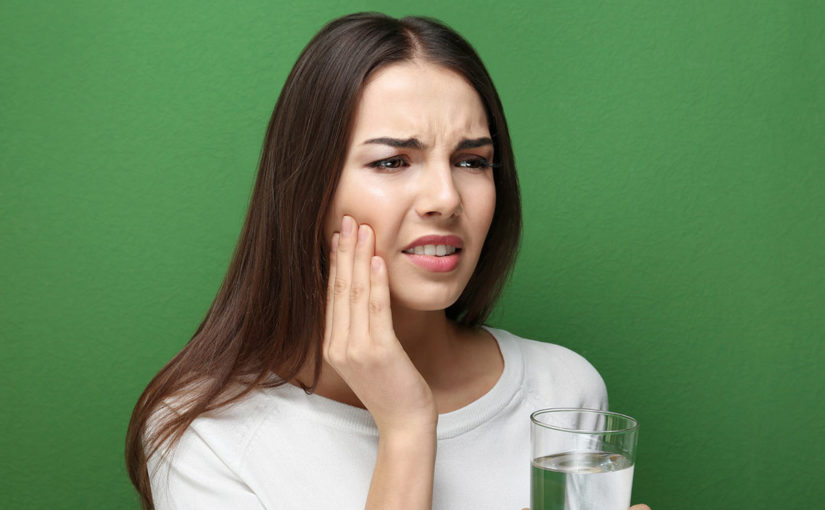Do you experience sudden pains in your mouth when you eat or drink? Sensitive teeth are one of the most common complaints in dentistry – and it affects all ages. That sensitive teeth pain you’re suffering from can be extreme. In some cases, it can even stop you from enjoying foods you love. But before you can start fighting sensitive teeth pain, you need to understand why it’s happening.
What’s Causing My Sensitive Teeth Pain?
While any damage to your teeth or gums can cause sensitivity, chronic sensitive teeth pain is typically caused by damage to your enamel. Enamel is a protective layer on the surface of your teeth that protects the crown and the dentin underneath. Over time, your enamel wears away the tubules in your dentin. When this happens, certain foods, drinks or even air will be able to reach nerves in your teeth and trigger pain.
There are many causes of enamel wear, both on the biting surfaces, and along the gumline. Here are some of the most common:
Excessive Brushing with a Hard Toothbrush – It may sound strange, but brushing with a hard toothbrush and/or with an abrasive toothpaste can be bad for your teeth! Stick to the recommended two minutes of brushing with a soft toothbrush, applying a moderate amount of pressure whether using a manual or an electric or sonic brush.
Eating Acidic Foods – Acidic foods and drinks are bad for your teeth. If you sip soda, eat a lot of citrus fruit or enjoy other acidic foods and drink, you’re slowly wearing away your enamel. Try to finish acidic foods or drinks quickly, and drink water afterwards to help rinse your mouth.
Poor Dental Care – The purpose of brushing and flossing is to clean away bacteria and plaque to prevent decay. Bacteria on your teeth consume sugars and leave behind an acidic waste. If you don’t regularly brush or floss, this acid constantly wears away at your teeth and enamel. Make sure you brush and floss every day!
Grinding Teeth – Tooth enamel is exceptionally strong, but grinding your teeth will still wear it away. Tooth wear will eventually lead to exposure of the inner tooth, both at the biting surface and at the gumline which is 700% softer than enamel. Then, more rapid tooth destruction and acid erosion will occur.
Receding Gums – Gum recession can be avoidable. But gum disease, tooth grinding, and other causes can speed the rate at which it happens. As your gums recede, they can expose dentin and cause sensitivity.
What Are Symptoms of Sensitive Teeth?
It can be difficult to tell if your dental pain is coming from sensitive teeth or something else. The degree of pain from sensitive teeth can range dramatically. An effective way to identify if your pain is due to sensitive teeth, ask yourself if you experience sharp pains from:
- Inhaling cold air
- Hot or cold food/drinks
- Sugary or sweet foods and drinks
- Biting down or pressure on your teeth
- Acidic foods or drinks
If your teeth hurt after any combination of these, it’s likely a sensitive teeth pain issue. Schedule an appointment with your dentist and they’ll help you reduce or eliminate your pain.
How to Reduce Sensitive Teeth Pain
There are steps you can take to minimize any potential tooth pain! If you’re looking to reduce the intensity and frequency of your tooth pain due to sensitivity, try these steps:
Avoid Acidic Drinks & Food
In addition to eroding your enamel, acidic foods or drinks will trigger a pain response in your teeth. If you love soda or orange juice too much to give them up, try drinking them through a straw or reducing the amount you drink each day.
Desensitizing Toothpaste
Certain toothpastes include active ingredients that block the pain signals coming from your teeth. They can take up to a few weeks to work, so they don’t offer any immediate relief. Keep in mind that these types of toothpastes will help reduce the pain of the symptom, but don’t treat the underlying cause. Even if desensitizing toothpaste works for you, you still need to visit your dentist to treat the problem!
Don’t Use Whitening Trays
Bleaching trays can cause sensitivity on their own. If you’re having issues during a whitening treatment plan, consider taking a break. Especially if your sensitivity is coming from other sources, your whitening trays may exacerbate the problem.
In-Office Treatments for Sensitive Teeth
If you’re taking steps to reduce your sensitive teeth pain and not seeing results, you may need a more in-depth treatment. Speak with your dentist about some of the following options:
In-Office Fluoride Gel – Your dentist can apply a specialized gel to the sensitive areas of your mouth to help reduce pain and strengthen tooth enamel
Dental crown, Inlay, or Bonding – If your sensitivity is caused by decay, these options can help fix the decay and solve your sensitivity issues.
Root Canal – If you have a severe case of sensitivity and other solutions haven’t worked, you may need a root canal.
Gum Graft – When you lose too much gum tissue and your root is exposed, a surgical gum graft may be recommended. The graft will cover and protect the root, reducing your sensitivity.
Are You Experiencing Sensitive Teeth Pain? Schedule an Appointment!
The dental professionals at Schmakel Smile Design can help you identify the cause of your sensitive teeth and recommend options for treatment. Make an appointment, or call us at (419) 841-9494.
We are proud to be your dentist in Toledo, near Sylvania. For more information about what we do, contact Schmakel Smile Design:
Phone: (419) 841.9494
Email: [email protected]
Website: www.toledodentistry.com.
Find us on Facebook | LinkedIn | Twitter | YouTube | Google+














